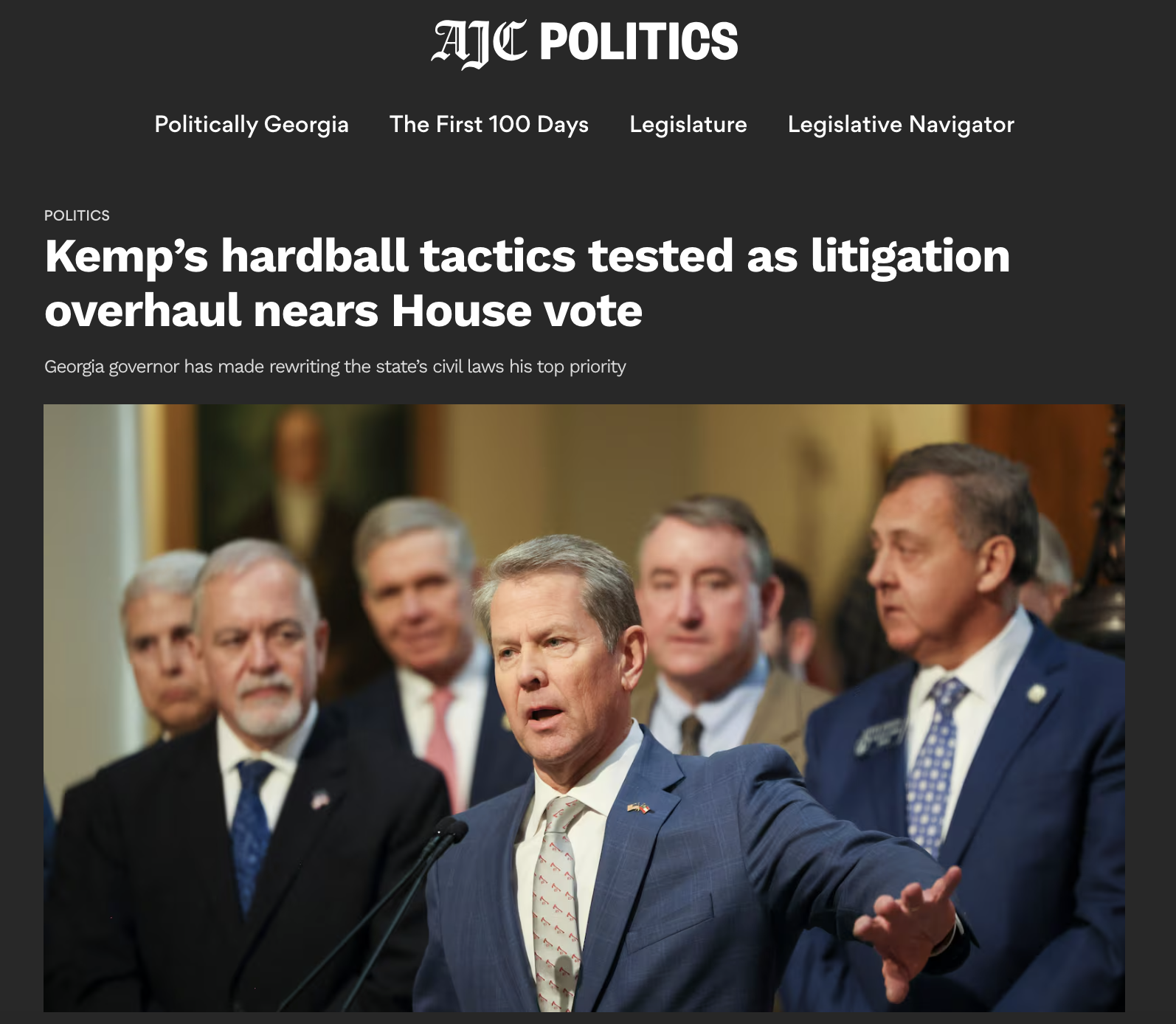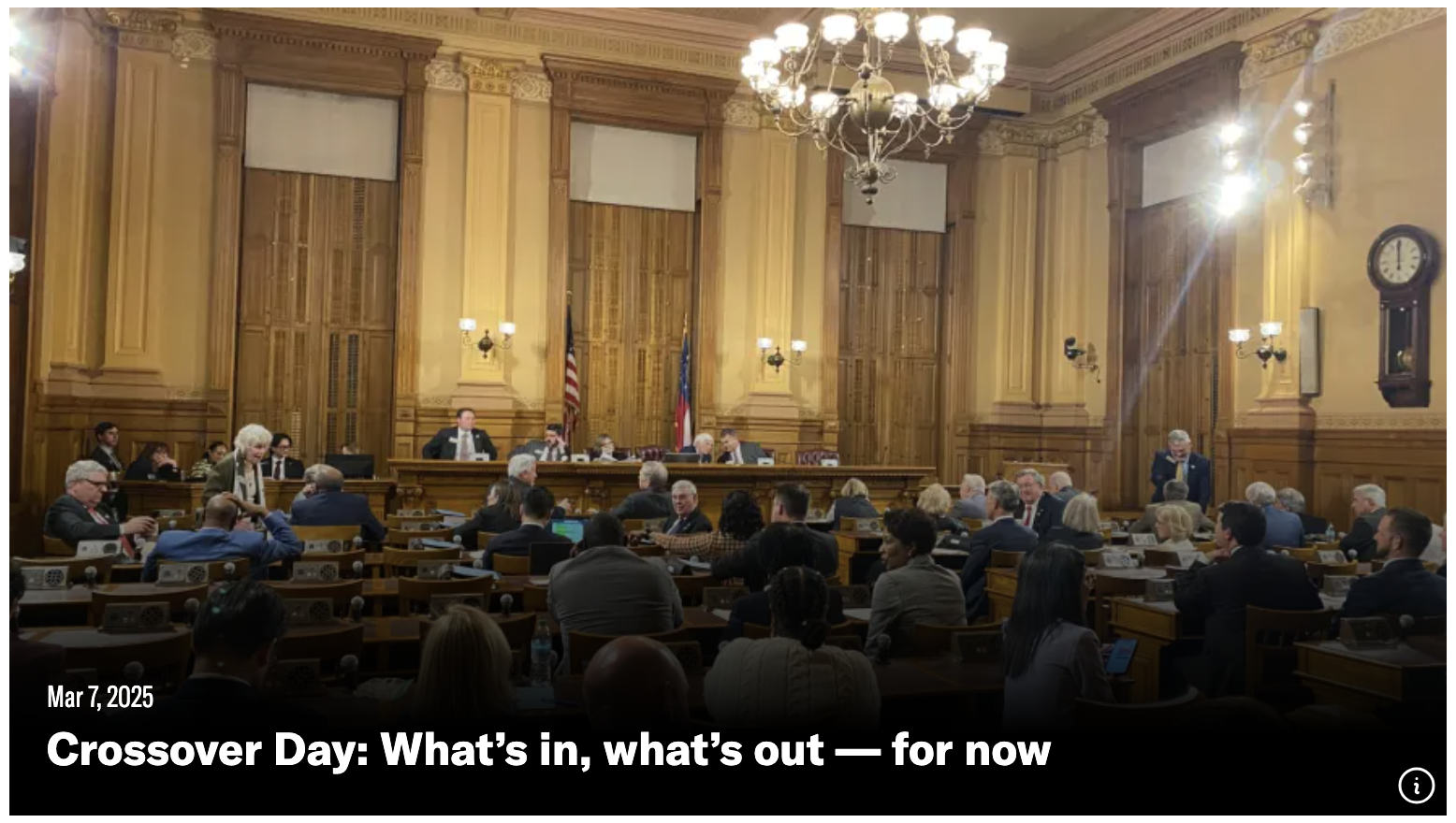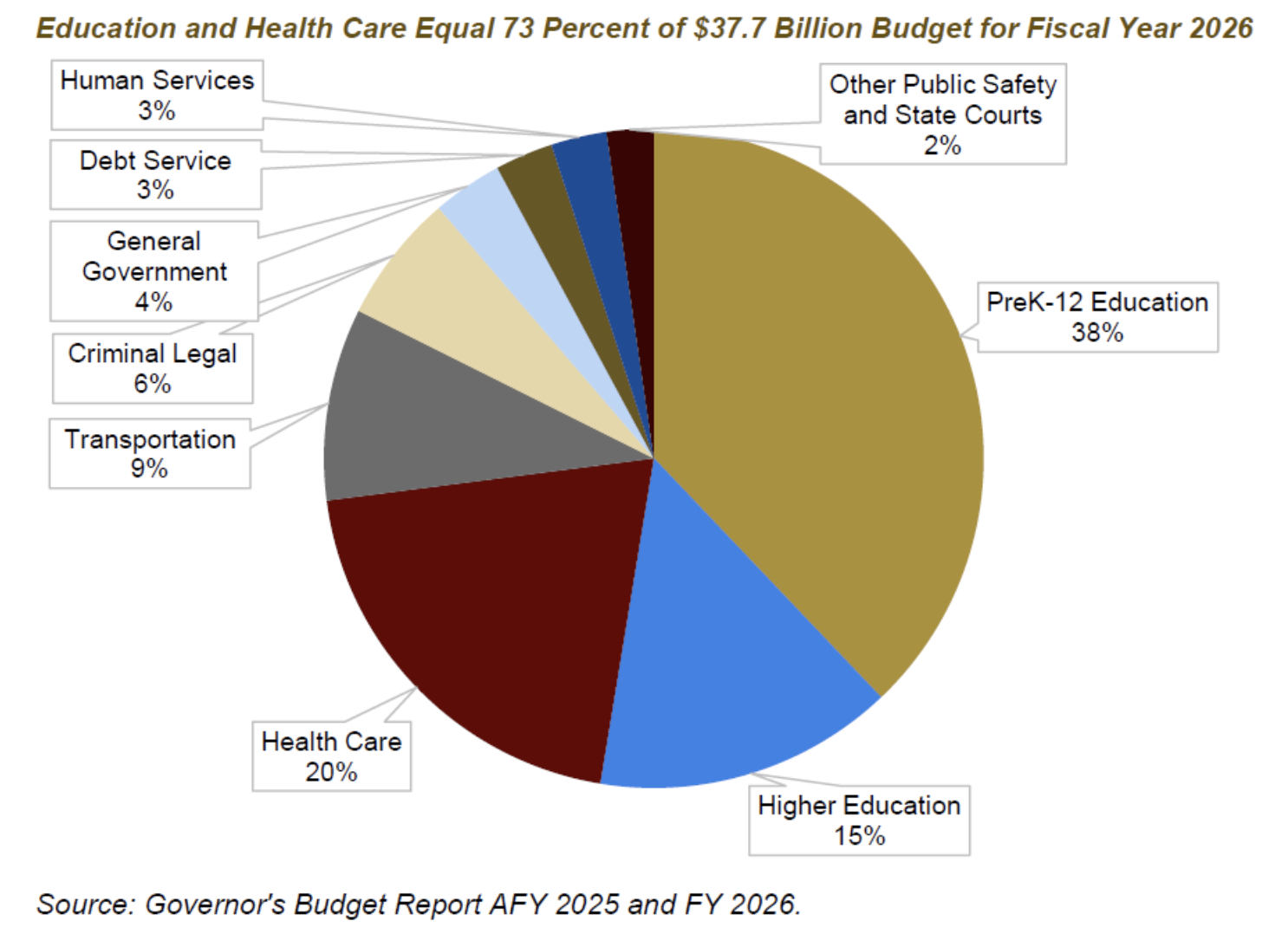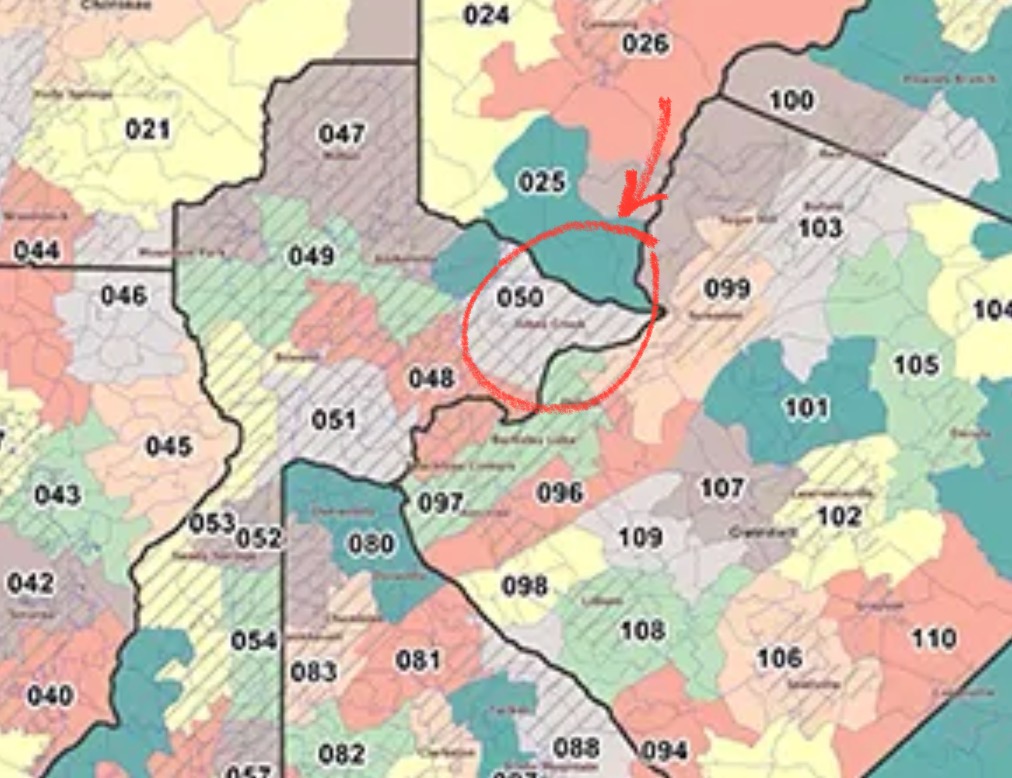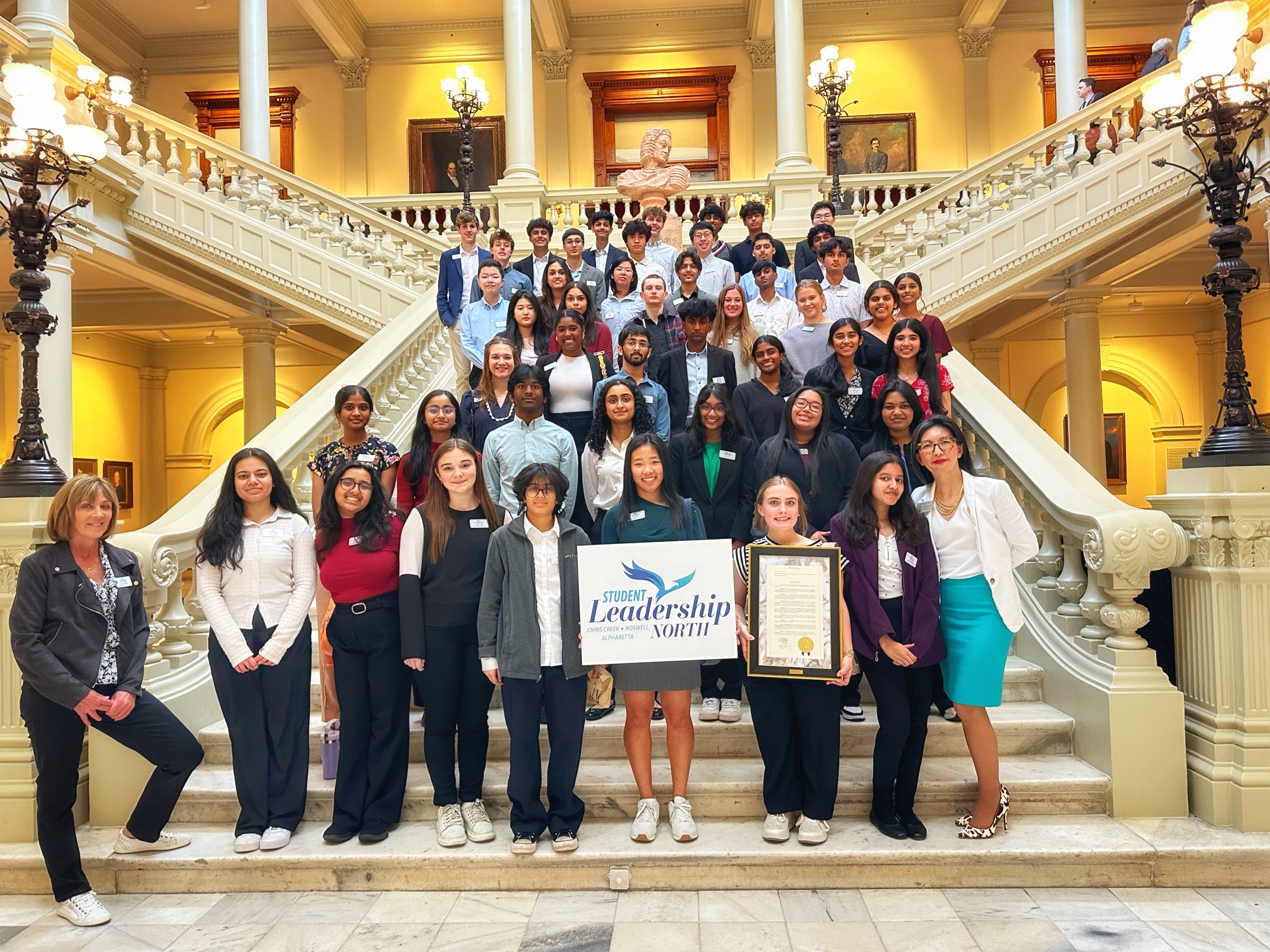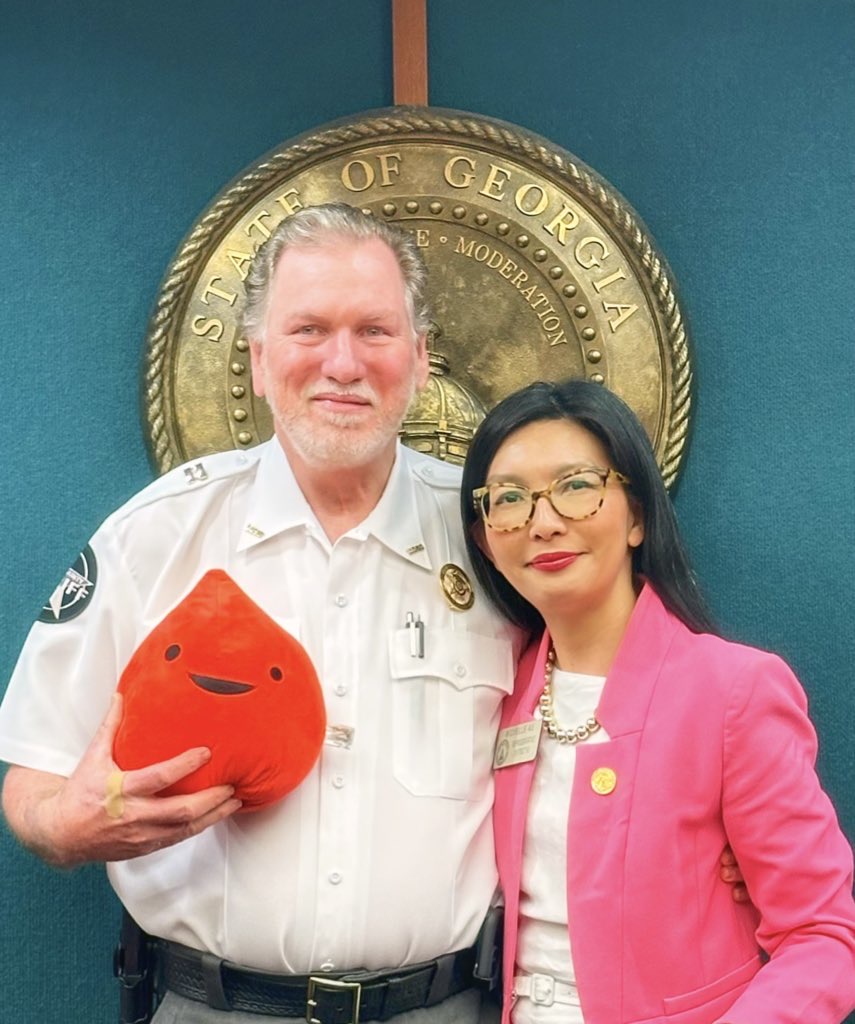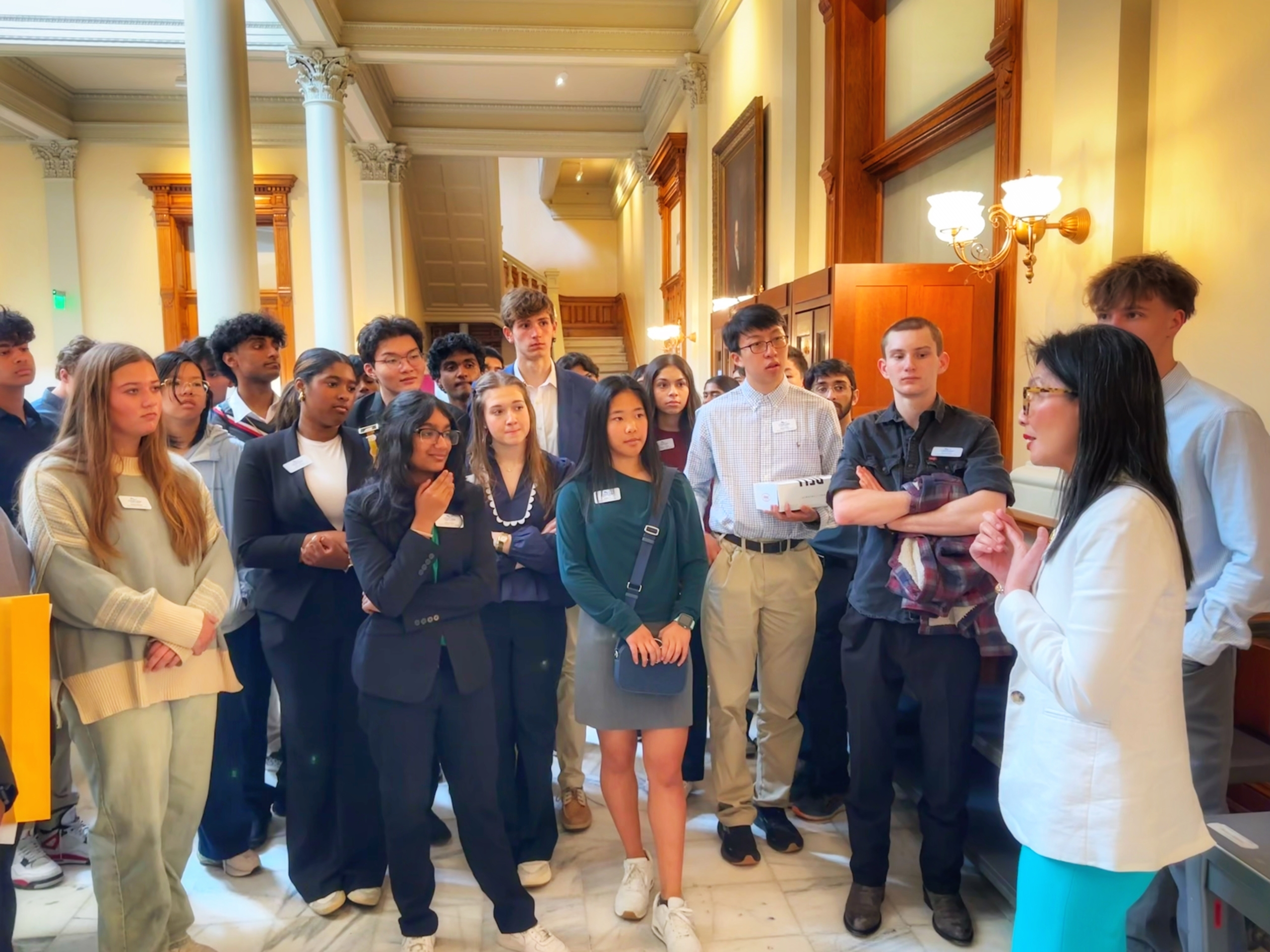Friends,
We made it through another Crossover Day, and by the end of the evening the Georgia House sent a record-setting 75 pieces of legislation over to our colleagues in the Senate.
For the rest of the session we should expect to be hearing, perfecting and voting on Senate bills that have crossed over to us, some of which deserve closer attention. The 2025 legislative session ends April 4th, which is the last day by which these bills can be passed in order to be signed into law by the Governor this year.
Let’s see what we have in store.
SENATE BILL 68: TORT REFORM
Jason Getz / The Atlanta Journal-Constitution / TNS
Governor Kemp’s top priority this session is SB 68, a bill which aims to overhaul Georgia’s civil litigation laws, an effort colloquially known as “tort reform.” This is a dense, complex piece of legislation with powerful groups across the political spectrum in support and opposition, and the governor has made it clear that he is putting all his political muscle into pushing this bill through.
Let’s explore what’s inside.
Limits on Noneconomic Damages
This bill modifies rules around arguing noneconomic damages in court, defining terms like “economic” and “noneconomic” damages and restricting how attorneys can discuss monetary values during trials. Lawyers would not be able to suggest a specific dollar amount for noneconomic damages (e.g. “pain and suffering”) to jurors before all evidence is presented. These arguments must also be limited to the facts of the case.
Shorter Deadline for Case Dismissals
This bill would alter procedural aspects of civil litigation, such as changing timing requirements for defendant answers, discovery stays, and voluntary dismissals. Plaintiffs would no longer be able to dismiss a case without prejudice (meaning they can refile later) after the first witness is sworn in. Instead, they must do so within 60 days of the defendant’s response to the lawsuit.
Premises Liability
The bill introduces new provisions for negligent security cases, establishing detailed standards for when property owners can be held liable for injuries caused by third-party criminal actions, including specific requirements about foreseeability and risk assessment. This would shield business owners from injuries committed on their property by someone other than themselves, their employees or contractors hired to provide security.
Restrictions on “Phantom” Damages
Special damages for medical expenses are limited to amounts actually paid or required for necessary and reasonable medical care. This prevents plaintiffs from claiming inflated medical costs that were never actually paid.
Trial Bifurcation
A defendant can request that a trial be split into two phases—one to determine fault and another to decide damages. This practice is known as “bifurcation” and is currently available at a judge’s discretion under current Georgia law. This aims to prevent sympathy for the plaintiff from influencing the jury’s decision on liability or, in medical malpractice cases, influencing a determination of whether the standard of care was met.
Seat Belts
This bill modifies rules about seat belt evidence in motor vehicle cases, allowing such evidence to be considered in determining negligence. Current state law forbids juries from considering evidence of whether someone was wearing a seat belt during a car accident.
This bill passed out of the Senate prior to Crossover Day and is currently being deliberated in a House Rules subcommittee, where it has not yet come up for a vote. There have been four hearings to date, the video archives of these hearings can be viewed here, here, here, and here.
It is also unclear whether we will see amendments on this bill in the committee process. That said, I anticipate we may see SB 68 hit the House floor this week.
CROSSOVER WINNERS AND LOSERS
Beau Evans / State Affairs
Here is a sample of some other bills of interest that made it past Crossover. Thank you to State Affairs Georgia for doing a nice recap, you can read the full article here. But in brief:
HB 111: A bill to accelerate the reduction of the individual income tax rate from 5.39% to 5.19%, with plans to further reduce the rate by 0.10% annually until it reaches 4.99%. However, these annual reductions are contingent upon meeting certain fiscal conditions, including the Governor’s revenue estimate being at least 3% higher than the previous year, net revenue collection being higher than the preceding three fiscal years, and the Revenue Shortfall Reserve containing sufficient funds to offset potential revenue decreases. If any of these conditions are not met, the tax rate reduction will be delayed by one year. I voted YES.
HB 127: Increases the number of annual sick days for public school teachers and other school personnel from three to five. I voted YES
HB 267: Requires student-athletes in all Georgia public schools to play on teams according to their biological sex assigned at birth, effectively barring K-12 and collegiate transgender students from Georgia school sports. Of note, the Georgia High School Association already precludes transgendered high school students from playing in girl’s sports, as does the NCAA at the collegiate level, making this bill both duplicative and performative. As a practicing physician I also see significant problems in replacing the word “gender” with “sex” across state code, as those terms are not interchangeable. On general principle, we should avoid introducing scientific inaccuracy into law, particularly to discriminatory effect. I voted NO.
HB 268: Speaker Burns’ school safety omnibus, which among other aims would create a student “threat” database for schools as well as improving communications between school systems for new student transfers. I voted YES.
HB 331: An animal welfare bill that aims to ban roadside sales of dogs, cats and rabbits. I voted YES.
HB 447: Creates penalties for people who steal, forge or commit fraud with gift cards. I voted YES.
SB 27: Criminalizes “doxxing,” in which a person publishes someone else’s personal information online with malicious intent. (This bill has not yet reached the House floor.)
SB 254: Would ban the sale of beverages containing hemp, a plant in the cannabis family that contains lower doses of THC than marijuana. The bill also would place a lower limit on the amount of THC allowed in hemp oils and gummies. (This bill has not yet reached the House floor.)
Arvin Temkar / AJC
Just as important to note as bills that made the Crossover Day deadline is bills that did not. Here are just a few of them, with the caveat that since legislative language can always be substituted into other bills, no piece of policy is truly dead for the year until Sine Die.
HB 686: Georgia is one of 12 states that doesn’t allow sports betting. While a constitutional amendment to change this is a perennial, at least every year I’ve been in the legislature, this proposal failed on Crossover Day. (Of note, public polling indicates that if this amendment were to come to the public for a vote, it would pass.)
SB 120: This bill proposed to withhold public funding from any K-12 public school, college or university that promotes diversity, equity and inclusion programs. This bill never reached a vote as the bill sponsor pulled it from consideration at the last moment. Nonetheless, it is still possible that this bill could be grafted onto another piece of legislation that already crossed over, however, so keep an eye on other bills in this same code section (Title 20)
FY 2026 BUDGET
While we spend a lot of time talking about other legislation, the legislature actually only has one constitutionally required task, which is to pass the state budget.
Natrice Miller / Atlanta Journal-Constitution
This week, the House passed HB 68, which outlines the budget for the 2026 fiscal year. There is, of course, more uncertainty this year than in past years, as the second Trump administration has made it a mission to slash federal funding across the board in service of a $4.5 trillion tax cut which would balloon the national deficit even as we cut essential services, particularly for the most needy.
Georgia’s proposed 2026 budget anticipates $22.5 billion in federal funds. How much of that money we will actually see remains a question, and I think we all need to view this first stab at the budget as a best guess in the face of rampant federal chaos that will ultimately affect every one of us. That said, here are some highlights from the House version of the FY 2026 budget (via our friend Danny Kanso at the Georgia Policy and Budget Institute)
(Source: Georgia Policy and Budget Institute
“Overview of Georgia’s Budget for the Amended 2025 and Full 2026 Fiscal Years.”)
Department of Education
- $306 million added to account for enrollment growth, which has reached 1.74 million students and over 148,000 teachers and administrators.
- $174 million added to finance a 7% increase in the employer health care contribution for the State Health Benefit Plan (SHBP), up from $1,760 per-member per-month to $1,885. Although not budgeted for by the state, local districts will have to shoulder a similar cost for non-certified employees such as bus drivers and maintenance workers.
- $20 million added to replace 227 school buses across the state.
- $10.3 million added for the Pupil Transportation Grant to help cover student transportation costs.
- $113 million in reductions for Equalization grants due to a narrowing gap in wealth between districts, and $116 million in downward adjustments to the Quality Basic Education Formula to account for districts raising more in property taxes.
Department of Early Care and Learning
- $14 million added for the second year of a four-year phase-in that will reduce Pre-K class sizes from 22 to 20 students.
- $4 million added to fund 500 more slots in the Childcare and Parent Services (CAPS) program for families with low incomes.
- $1.5 million added to adjust CAPS program reimbursement rates to the 60th percentile of costs.
Higher Education
- $170 million added for instruction to reflect an increase in credit hour enrollment at University System of Georgia (USG) institutions.
- $119 million added for capital projects at USG institutions.
- $81 million in additional lottery funds for HOPE scholarships and grants
- $33 million added for instruction to reflect an increase in credit hour enrollment at Technical College System (TCSG) institutions.
- $21 million in additional funds for Dual Enrollment program needs.
Health
- $324 million added for Medicaid and PeachCare, including $23 million to provide 12 months of continuous eligibility for children under the age of 19.
- $44 million added for the Department of Behavioral Health and Developmental Disabilities to support reimbursement rate increases for home- and community-based providers and to open additional slots that allow individuals with intellectual and developmental
I voted YES on the House version of the budget, which passed 171-4. The bill now crosses over to the Senate, where it will almost certainly be amended before Sine Die.
UPCOMING EVENTS
Especially in our area, a swing district in the heart of a swing state, I have noted a resurgence in interest and engagement with all levels of government. I’ve also noted that, given how unpopular DOGE, tariffs, and the general chaos of the federal administration has become, our Republican colleagues have been encouraged to avoid holding in-person town halls with their own constituents.
No problem. They can come to ours.
HOUSE DISTRICT 50 PRE-SINE DIE TOWN HALL
Saturday, March 28th, 3:00 – 5:00pm
Johns Creek Fire Station #62
10925 Rogers Cir, Johns Creek, GA 30097
Easily accessible from North Fulton, Gwinnett, and South Forsyth
RSVP here: bit.ly/AuMarch29
TEAM AU IN ACTION
WELCOMING STUDENT LEADERSHIP NORTH
Team Au has had a long relationship with Student Leadership North (née Student Leadership Johns Creek), which helps high school students from Johns Creek, Alpharetta, and Roswell engage in civic leadership and interact with all levels of government.
I was proud to welcome these young leaders to the Capitol this week, where I presented them with HR 324, commending their work and initiative. Come back and see us again soon!
2025 CAPITOL ARTS EXHIBITION
I loved joining families and students from House District 50 and around the state at the annual Capitol Arts Exhibition this last week! I got to see the award-winning pieces of students from HD 50’s own Dolvin Elementary School and Northview High School, among others, and enjoyed chatting with the kids and their families about their art.
Congratulations to all on an incredible showing!
GEORGIA TRAUMA COMMISSION
The House Public and Community Health Committee had the privilege of hearing from the Georgia Trauma Commission this week, and to meet a very special patient, Captain Bracewell, who survived a severe motor vehicle accident due to the expert and high quality trauma care he received in South Georgia.
Of note, Captain Bracewell received 67 units of transfused blood over the course of his surgery and recovery, and we were so honored to have his support for our Gold Dome Blood Drive 3/13, which enables us to write more happy endings like his.
YOUNG DEMOCRATS OF GEORGIA
I was honored to join the Young Democrats of Georgia this weekend for a panel discussion and call to action as we all process the norm-shattering second Trump administration and strategize on ways to fight back.
In this moment, we simply cannot afford to have any one of us sitting on the sidelines. It is incumbent on everyone to stay engaged, raise your voices, don’t pull your punches, and keep showing up.
Interested in connecting with the Young Democrats of Georgia? Learn more here and join the team.
* * *
It has never been more important to pay attention to the work of state legislatures. Thank you as ever for your support so that we can keep doing this most important work together.
As always, please do not hesitate to reach out to our office should you need any assistance, or if you have any concerns you’d like me to address on your behalf.
It is my honor to be your voice in the Georgia House of Representatives.
In service,




